NODES

Start
The Start Node is the first node in a dialogue. It
connects to the first node in your dialogue tree, signifying which node
your tree will start with. Unlike every other node, the Start node has a
static position.

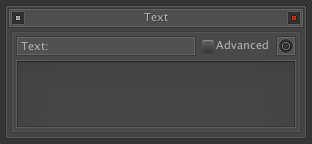
Text
The Text Node is your standard node. It takes a
text input, and has one output. After the Dialogue system has continued
the node, it will continue on to the next node.
Checking the Advanced checkbox will display the advanced Text Node controls, allowing you to set data for the Theme/Skin, Character Name, Portrait, Audio, Metadata, and Position of the node. These are then accessible in the object returned with the Text Node when creating your Dialogue Theme.

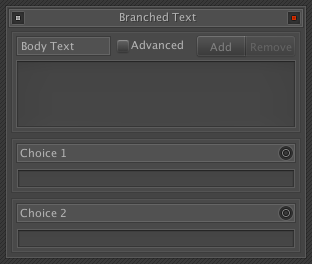
Branched Text
The Branched Text Node is a more complicated
version of the Text Node. The Branched Text Node will present the player
a set number of choices, as well as a text body (similar to the Text
Node). The Branched Text node needs to be continued with a number, that
number being the index of the choice the player chose. That way, the
dialogue system will know which branch to follow in the dialogue tree.
The Advanced checkbox does the same thing as the one in regular Text Nodes.


Wait
The Wait Node can serve one of three functions.
These functions are Seconds, Frames, and Continue. The function can be
selected by clicking the appropriate button on the node.
Seconds will cause the Dialogue system to wait for the set number of seconds.
Frames will cause the Dialogue system to wait for the set number of frames.
Continue will cause the Dialogue system to wait for a continue before proceeding, which allows you to wait for a key press, or game event.

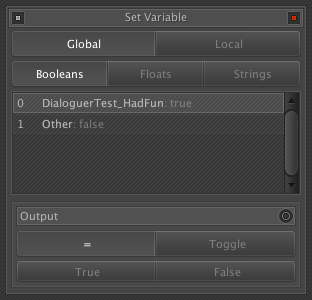
Set Variable
The Set Variable Node allows you to set a variable through Dialoguer. Dialoguer has two types of variables: Local and Global.
Local variables are specific to that dialogue. They are used for internal dialogue loops, choices, etc. Local variables are not meant to be accessed by the rest of the game, they are specific to that Dialogue, and that's it.
Global variables are accessible outside of the Dialogue system using Dialoguer.GetGlobalFloat(i), Dialoguer.GetGlobalBool(i), Dialoguer.GetGlobalString(i), etc, and can be set using the Dialoguer.SetGlobalX methods.
These variables are all created in the Variable editor, accessed from the Dialoguer > Window > Variables menu.

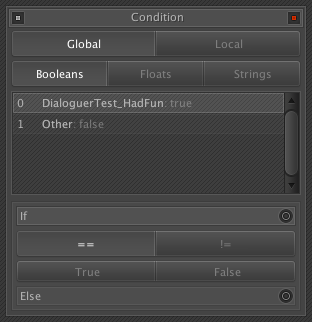
Condition
The Condition Node is the opposite of the Set
Variable Node. This node check a variable (local or global) and selects a
branch to progress along based on the outcome.

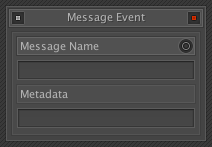
Send Message
The Send Message Node is a node which allows you
to send a message to anything listening to the Dialogue system for
message phases. This allows you to hook in any system of your choice to
Dialoguer, giving you the ability to make external calls from within a
dialogue that effect other parts of your game.


End
The End Node is the hooked up to a node's output
when you want the dialogue to end at that point. A dialogue can (and
most likely will) contain multiple End Nodes.